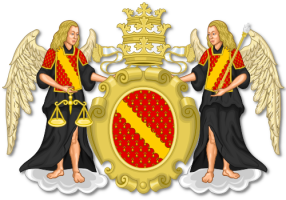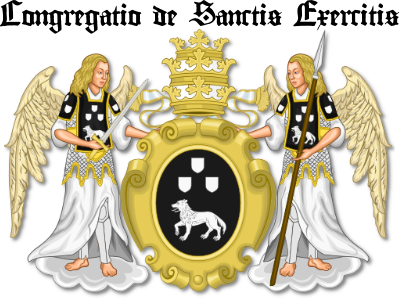 |
L'Eglise Aristotelicienne Romaine The Roman and Aristotelic Church
Forum RP de l'Eglise Aristotelicienne du jeu en ligne RR
Forum RP for the Aristotelic Church of the RK online game
 
|
| Voir le sujet précédent :: Voir le sujet suivant |
| Auteur |
Message |
Sixtus
Pape


Inscrit le: 03 Juil 2014
Messages: 4165
Localisation: Sur les rives du Tibre
|
 Posté le: Mar Mai 18, 2021 7:35 pm Sujet du message: State of the Congregations Posté le: Mar Mai 18, 2021 7:35 pm Sujet du message: State of the Congregations |
 |
|
The time has come to review the current state of our congregations, so that we may see what needs to be improved or changed.
Each Congregation will have to submit a detailed report of what has been done, what is being done and what still needs to be done. Difficulties, problems or other needs should be reported as well.
The chancellors, except for the Holy Office which falls unto cardinal Neirin as prefect general, will have ten days from now to submit their reports.
_________________

Eskerrik asko Iñési sinaduragatik |
|
| Revenir en haut de page |
|
 |
Kalixtus
Cardinal


Inscrit le: 24 Fév 2013
Messages: 15420
Localisation: Roma, Palazzo Doria-Pamphilj
|
 Posté le: Mar Mai 18, 2021 11:04 pm Sujet du message: Posté le: Mar Mai 18, 2021 11:04 pm Sujet du message: |
 |
|
Report of the Congregation for the Dissemination of the Faith.
The general functionality of the Congregation is guaranteed even in times of crisis. The fundamental reform by His Holiness is still pending, we are happy to work on a common concept, which does not differ much in content but could probably offer some structural facilitation.
The main problem, as everywhere, is staffing. It is difficult to maintain the high demands I have on the congregation and on myself with enough staff. Nevertheless, we do not want to cut back on the quality of our work. In general, the merging and closing of forum sections has made the work much more routine. The prefects work harmoniously with the Congregation leadership.
The Congregation for the Dissemination of the Faith is dependent, especially on the sister congregation CSO. Unfortunately, the activity status is rather modest. Also, a connection to the Nunciature and the New Apostolate will be helpful for future projects. The latter works closely with the university.
Overall, appropriate projects are in the pipeline and major reviews. Other projects, such as the Brotherhood of Exorcists, need specific cooperation with the CSO. There is already contact with Eminence Neirin on this.
Here is a more detailed look at the individual prefectures:
Prefecture for translations of the Villa St. Loyats
The villa is struggling with the problem of the library. Unfortunately, we are only making slow progress here; like everywhere else, there is a lack of active staff. We are making progress with the translation into German. This area will be fully completed in CIC and Dogma this year, following France and Portugal. England, Italy and Spain will then fill in the gaps. However, the core elements are present in all languages.
The main problem remains motivation, time and staffing, as well as active cooperation with the library.
Prefecture for Aristotelian Teachings and Educational Institutions
The heart of the Congregation is the Aristotelian Teachings. The closure of Fornovo is imminent. The proclamation will be made promptly. The establishment of an Italian seminary at the Pontifical University has already happened. The university is the international centrepiece of the teachings and is becoming increasingly popular with students from all over the world. The courses and lessons will be checked for currency and verified by the CDF for the first time by the end of the year. The last remaining Italian seminar will also be audited this year. A full audit of the French seminars will not be carried out this year, they have already been verified by January. However, each seminary must complete a quarterly audit at the end of the year.
One of the bigger tasks for the seminaries is still the upcoming move to Rome, as requested by His Holiness. More pressure must indeed be exerted on the rectors to complete this process more quickly.
The Roman Regular Chapter
The religious orders are to receive unifying statutes in the future, this thought of His Holiness has not yet been implemented. The prefecture needs an active prefect who will lead an appropriate conference and unify its content. This issue needs to be actively worked on. Hopefully, these omissions will have been resolved by the end of the year, so that we can conclude with this project and correspond with that of the pilgrimages. The Europe-wide network of pilgrimage routes and religious houses would be a successful project for spreading the faith.
Facilitating the requirements for founding a religious order is on the reform agenda.
Prefecture for Pilgrims and Pilgrimages
Here, the future work consists of redefining the pilgrimage routes to cooperate as a network with the existing religious orders. For long pilgrimages, the establishment of pilgrimage churches, hostels under the control of the spiritual orders would be an exciting extension of the network. With the incorporation of France, Spain and Ireland, new places for pilgrimages are emerging, these should be aligned with the Congregation of the New Apostolate and the CSO regarding relics in the near future.
In this prefecture rests a steady potential but also much work in forthcoming updates of the map material.
Prefecture of the Chapel Registry
The chapel registry runs harmoniously and evenly. Applications are processed regularly and promptly. There are no complaints whatsoever. The theological and dogmatic requirements for chapels are the constant basis for decisions. So that, for example, ship chapels and inn chapels have been rejected so far.
Prefecture of the Vatican Museums
The museums are a place of encounter. Due to the tense geopolitical situation, there are unfortunately only few of them. A corresponding conceptualisation of how to better stage these places is in the works and can be done in cooperation with the nunciature, for example, or with the Congregation for the New Apostolate and the papal chancellery in a larger, joint framework.
Exhibitions on iconography would also be interesting, but this would require active cooperation with the CSO. Such an exhibition could also be used for diplomatic contacts and thus serve as a visiting centre for a wider public.
Brotherhood of Exorcists
The Brotherhood of Exorcists always experiences a certain demand for its existence and I wish we could finally take up this topic and implement it. Unfortunately, theological and dogmatic structures have to be created in advance over which the CDF has no influence. Only in cooperation with the CSO and subsequently the Curia can an implementation and clarification of all points of conflict in the past teaching materials and views take place. The role of the soul, the shape of hell, the function and abilities of the creature must be theologically and dogmatically evaluated, updated and adjusted. The question of spirits, mythical creatures and other things that appear in the old doctrinal texts sometimes heretically contradict the dogmatic ideas about soul and bodily substratum.
As soon as these things are updated and adapted, nothing stands in the way of a renewed opening of the brotherhood.
Liturgical calendar
In collaboration with the CSO, the Liturgical Calendar could be developed and published on time and according to the existing structures. Translated into the central core questions and Latin. The corresponding notice can also be found in the public area of the CDF.
In the future, this calendar will also be developed in cooperation with the CSO on the basis of the standardised structures.
_________________
 |
|
| Revenir en haut de page |
|
 |
Gropius
Cardinal


Inscrit le: 12 Nov 2015
Messages: 5433
Localisation: Roma, Palazzo Della Scala
|
 Posté le: Sam Mai 22, 2021 12:12 am Sujet du message: Posté le: Sam Mai 22, 2021 12:12 am Sujet du message: |
 |
|
| Citation: |

Congregation for the New Apostolate.
The Congregation works according to its mandate in places where the hierarchies are incomplete or insufficient or not self-sufficient.
Since we have been running this Congregation we have solved the problems of:
Portugal
Spain
We are working in:
Great Britain, where unfortunately the work done previously and which had led to the appointment of two cardinals was thwarted by their demise.
At the moment we have a Carthulary for Great Britain, Father Francesco Maria Sforza, who is struggling with difficulty, but also with determination, against the narrow-mindedness of the native population and an endemic lack of vocations.
Poland. Here, our Carthulary Pawcio, Deacon of Plock, is trying to mend relations with the temporal power and bring people closer to our cause.
Croatia. Our Carthulary Krasoliub, archbishops od Rijeka, has been working for some time now. We have a new Bishop of Vrbovsko, Karl_franz, and we are organising the coronation ceremony of the King of Croatia and Hungary. Unfortunately, one of the cardinals we managed to get appointed, Eren, has passed away. It would help if Her Eminence Kiscsillag were more present.
The work of this Congregation is not at all easy, as we are often seen as foreigners who are interested in local affairs or who want to interfere. However, we proceed without fear and for the good of the Church.
We need a Vice-Chancellor and I propose the name of Francesco Maria Sforza. |
_________________

Cardinal-Bishop † Dean of the Sacred College of Cardinals † Grand Audiencier of the Holy See † Vice Chancellor of the Pontifical Chancellery † Archbishop of Strasbourg † Governor of the Patrimony of Titus † Prince of Viterbo † Marquis of Santa Marinella ♝Il cielo e la terra♗ |
|
| Revenir en haut de page |
|
 |
Sixtus
Pape


Inscrit le: 03 Juil 2014
Messages: 4165
Localisation: Sur les rives du Tibre
|
 Posté le: Jeu Mai 27, 2021 1:34 am Sujet du message: Posté le: Jeu Mai 27, 2021 1:34 am Sujet du message: |
 |
|
The deadline has almost come and only two congregations have presented their report. Do you need an extension or should we consider this a lack of interest?
_________________

Eskerrik asko Iñési sinaduragatik |
|
| Revenir en haut de page |
|
 |
Adonnis
Cardinal


Inscrit le: 19 Jan 2018
Messages: 5209
Localisation: Monte Real/Leiria - Palazzo Taverna/Roma
|
 Posté le: Jeu Mai 27, 2021 3:29 am Sujet du message: Posté le: Jeu Mai 27, 2021 3:29 am Sujet du message: |
 |
|
In my particular case, I would be grateful to His Holiness for an extension of time.
I have already started the draft, but for different reasons I haven't been able to write it yet.
_________________

.....Cardinal-Presbyter of Saint Anthony of the Portuguese / Grand Audiencier of the Holy See / General Inquisitor of Portugal
...............Primate of Portugal / Metropolitan Archbishop of Braga / Bishop of Vila Real / Duke of Monte Real |
|
| Revenir en haut de page |
|
 |
Fenice
Cardinal


Inscrit le: 19 Déc 2010
Messages: 12333
|
 Posté le: Jeu Mai 27, 2021 6:57 am Sujet du message: Posté le: Jeu Mai 27, 2021 6:57 am Sujet du message: |
 |
|
Me too. No lack of interest, but I need some more time. Thank you.
_________________
 |
|
| Revenir en haut de page |
|
 |
Fenice
Cardinal


Inscrit le: 19 Déc 2010
Messages: 12333
|
 Posté le: Jeu Mai 27, 2021 10:42 pm Sujet du message: Posté le: Jeu Mai 27, 2021 10:42 pm Sujet du message: |
 |
|
| Citation: | 
Congregation of the Nunciature
Recent activities and achievements of the Congregation:
* signing of the concordats of the Kingdom of Two Sicilies, Republic of Genova, Provence, Bayern, Flandres
* management of the diplomatic aspect of the imperial crisis
* diplomatic table for the resumption of relations with the Kingdom of France and opening of negotiations for a new concordat
Recently, the Hispanic Secretary (Cardinal Felipe) and the Ambassador for Castila y Leon (Henriique) were appointed.
A masterclass will be organised to better prepare staff for the increasing difficulties of the job.
The Diplomacy course will soon move to the new premises of the Monastery and Seminary of San Domenico here in Rome.
As always, the work of the Protonotary, Mgr Melian de Ventoux, is invaluable, she shows great diplomatic skills and an attentive and constant presence.
Like the other Congregations, the Nunciature suffers from a lack of personnel, and the scarce activity of some staff members.
The greatest difficulty is that diplomatic relations and concordat negotiations are becoming increasingly lengthy and require a great deal of patience, firmness and flexibility. It is an extremely demanding job, facing representatives of the temporal power who are becoming more and more demanding, disrespectful and often threatening. |
_________________
 |
|
| Revenir en haut de page |
|
 |
pamelita
Cardinal


Inscrit le: 15 Oct 2013
Messages: 3867
Localisation: Ducato di Milano
|
 Posté le: Jeu Mai 27, 2021 11:22 pm Sujet du message: Posté le: Jeu Mai 27, 2021 11:22 pm Sujet du message: |
 |
|
| Citation: | 
Congregation of the Holy Inquisition
Recent activities and achievements of the Congregation:
* We have appointed the Prefects and Procurators General of : Italy France Germany and Spain.
* For France we have lifted all previous appointments so that we can redo the appointments with present inquisitors.
* For Italy, we have eliminated all inactive inquisitors and created a new working group.
* We have reopened the court of Hispanic officialdom after a long period of inactivity and created a new working team.
I confess that the congregation is not working at full capacity, but with the appointment of a vice-chancellor and the collaboration of the present inquisitors
we hope to be able to reactivate the various offices as soon as possible.
We intend to initiate discussions with the various language regions in order to have a broader vision of the problems, needs and future plans of the congregation as soon as possible. |
_________________
 |
|
| Revenir en haut de page |
|
 |
Tymothé de Nivellus
Cardinal


Inscrit le: 22 Nov 2017
Messages: 6752
Localisation: Cardinal Camerlingue de Rome et Chancelier de la Chambre Apostolique
|
 Posté le: Ven Mai 28, 2021 10:53 am Sujet du message: Posté le: Ven Mai 28, 2021 10:53 am Sujet du message: |
 |
|
| Tymothé de Nivellus a écrit: |

Apostolic Chamber
Activity Report of the Apostolic Chamber
We, Tymothé-Lovian Méléagant de Nivellus de Montvidor, Cardinal Camerlingue of Rome and Chancellor of the Apostolic Chamber, Archbishop of Embrun Prefect of the Press and Parchment Office, Vice-Prefect of the French-speaking Inquisition
General Information:
The mission of the Apostolic Chamber is to manage the finances and property of the Holy Roman Church.
Before Endymion there was Bardieu and certainly many others. The congregation bore the name of the Office du Grand Camérier.
Appointment of Endymion d'Abbadie as Prefect General on August 9, 1468
Revocation of Endymion d'Abbadie on November 5, 1468.
Appointment of Tymothé de Nivellus as French-speaking Vice-Prefect on November 5, 1468.
Appointment of Tymothé de Nivellus as Camerlingu of Rome and Chancellor of the Apostolic Chamber on March 23, 1469
Nominative composition of the team:
-S.E Tymothé de Nivellus, Chancellor
-S.Excellence Mgr Francesco Maria, Secretary General.
-S.E Rodrigomanzanarez, English-speaking Vice-Prefect for the Scotland region.
-S.Excellence Monsignor Arthur de Nivellus, French-speaking Prefect.
-Brother Filsix du Val d'Authie, General cameraman for the French-speaking prefecture
- Monsignor Idril of Sparta, French-speaking Vice Prefect for the region
Revocation:
April 14: Honoria of her charges for breach of trust following her merger with Iaudas.
Structures and organizations
Infrastructure and premises
We have created the linguistic prefectures in two parts:
-A part entitled: Prefecture (followed by the linguistic particle)
-second part entitled: Offices (follow-up of the linguistic particle)
The 1st part is made for the organization of the prefecture itself. It is in this place that it organizes its operations and its meetings with the bishops.
The second part are the accounts registers of each diocese. Each bishops or diocesan representatives can complete the report on the finances of the diocese.
Currently the following prefectures have been created: Italian-speaking, French-speaking, German-speaking, Hispanic, and English-speaking
We decided that it was not opportune to create the other prefectures directly for the simple reason that it will require consultation with the Congregation of the New Apostolate for the regions where His Eminence Gropius works on a daily basis.
It was also created a part called: "Saint-Antoine le Grand room" - this room is the relay between the Apostolic Chamber and the Holy Armies. It is a meeting place between the authorities and which allows the Holy Armies to be reactive when needed. Currently present in this room: The Chancellor of the Apostolic Chamber, the Chancellor of the Holy Armies, Melian and the Elector Cardinals.
There are several meeting rooms currently unused.
A High Council was there before my arrival. It will allow us to create liaison offices when important information is disseminated to the Prefectures. He succeeded all the "senior officials" of the Apostolic Chamber.
A Library: this has not yet been used, but several pieces of information will be there.
An Archives room (with the recovery of part of the archives of the Office du Grand Camérier).
Two private offices for the Secretary General and for the Chancellor.
Organization:
We have organized the linguistic regions in the Prefecture. There will be no vice-prefect in the regions where it is not necessary (less than 5 dioceses). For the French-speaking linguistic region, there will be a vice-prefect for France, one for the Holy Empire and Brittany. For the English-speaking region, there will be a prefect, three vice-prefects. The region being difficult it is better to separate those responsible (an Irishman will not accept the authority of a Scotsman or an Englishman, and the reverse either way).
Currently we do not yet have a statute but we are going to propose to the Curia and the Holy Father to create a commission to set them up.
We prefer to avoid arriving with a project made with our own hands and imposing an organization. The objective of this commission is to remain as transparent as possible. Let us keep in mind that this is a Congregation whose principle is to restore order where there is none. We must be able to create statutes that will put a framework where there is none yet.
It should be understood that the Apostolic Chamber needs to work in concert with:
The Congregation of the New Apostolate, The Congregation of the Holy Armies, The Congregation of the Diffusion of the Faith, The Congregation of the Affairs of the Century and the Congregation of the Holy Inquisition.
Why?
The congregation of the New Apostolate; It is important not to encroach on the territories where His Eminence Gropius works and organizes the development and religious integration in the regions which are not yet all attached to the Holy Aristotelian Church. For the sake of his work. A consultation is necessary and nothing should in my opinion be done without his agreement.
The Congregation of the Holy Armies; It is important that the two congregations can put in place a system which makes it possible to finance our Holy Armies and to prepare and anticipate their needs. The defense depends on this Dicastery, it protects the dioceses. It is therefore imperative to invest massively and intelligently in it.
The Congregation for the Diffusion of the Faith; Our greatest wish is to be able to organize training. Short but which allows the laity to understand the functioning of the church. Let them know where they are going and how we operate. This training requires the help of educational experts in the Diffusion of the Faith and we would like this diploma to be validated and delivered by Seminars recognized by the Diffusion of the Faith.
The Congregation for the Affairs of the Century; In line with the Office du Grand Camérier. There were treaties between the duchies and the offices of the camériers. It would be good to be able to set up together a standard treaty and contracts depending on the regions, customs and traditions of these regions, and to respect the agreements already in place (if a financial part already exists?), Why not also incorporated it in these to anticipate the possible commercial agreements. Knowing that the goal is also to be able to help the duchies to deal together. We have the possibility of issuing money orders from one diocese to another and thus avoid financial losses on the roads.
The Congregation of the Holy Inquisition; If a framework is needed, it is not possible without regulation. It seems obvious that the Apostolic Chamber should in no case be justice and even in financial matters. It will therefore be necessary to consult the courts and the penitentiary in order to be able to sanction thefts, embezzlement and others. And of course make sure that the penances have been respected? (It happens that one of the penances can be a donation in a parish. It is conceivable that only the Apostolic Chamber can validate with the Penitentiary that it has indeed been done ...).
We need to collaborate with a majority of Chancellors for these reasons and we hope to be able to organize this in the coming months.
living environment
Fram:
Analysis of current activities
We were mainly able to work with France, Italy, the French-speaking of SPRING
In the coming months we will try to invite the primates and vice-primates to a meeting to adapt to the situation on the ground. Some Primacies do not work the same way. The Apostolic Chamber will therefore have to adapt.
The main mission of the Prefects and Linguistic Vice-Prefect of the Apostolic Chamber will be relations with primacies and bishops. They will have the role of intermediary and communication.
-relation with the Holy Armies
As already stated above, we have created a room "Saint-Antoine le Grand room" for relations with the Holy Armies. Meetings will be held there according to the needs of our armies. +
-relation with archbishops and bishops.
Some bishops and Cardinals are in disagreement and have already expressed it. They feel they are responsible in their Diocese. If we look today, only three Cardinals shared the accounts of the dioceses they manage. It is the duty of the authorities to lead by example. Also, we invite our brother Cardinals to lead by example!
"Considering that a stable and functional management of our finances is necessary, even while awaiting more exhaustive reforms, and having thought at length about the best way to ensure this management; through our supreme apostolic authority, we have decided, established, decreed and enacted, and we decree and rule the appointment of His Eminence Endymion d'Abbadie as Prefect General of our Apostolic Chamber. Awaiting new reforms and the emanation of the canons relating to the said Congregation, he will enjoy full authority over the structure, composition and functioning of the Apostolic Chamber, including the appointment of prefects for each linguistic area, under our supervision and under the guise of maximum transparency vis-à-vis the Holy See and the Sacred -College. In addition, since we have already been questioned several times on this question, we must remind everyone, from the cardinal to the simple faithful, that money and goods advise rvés in the coffers and the deposits of the dioceses and the parishes belong exclusively to the Holy See and can be used and distributed only on order or authorization of the Holy See, and consequently any contract, transfer or movement of money or goods of the diocesan or parish coffers and deposits which have not been previously approved by the Holy See or the Apostolic Chamber is totally illegal and without any validity and therefore considered as a theft perpetrated against the Church. We wish to recall in this regard that the Church is entirely governed by canon law and that neither the dioceses nor the parishes can legally endow themselves with their own statutes, in particular in the administration of the treasury, and in particular that the diocesan councils cannot have no legislative, decision-making or advisory power and that its members, like any other person, are expected to act in accordance with canon law; any so-called regulation relating to this or other matter is therefore equally unlawful and of no value. In this regard, we must clarify later that the adage "every bishop is a pope in his own diocese" is totally false and unfounded insofar as it implies that a bishop is free to do anything, since bishops, like all clerics and all faithful, are subject to respect for canon law; on the contrary, it stipulates that the work of a bishop, if it is carried out within the limits and in respect of dogma and canon law, cannot be unionized by another bishop as such, except for duly provided exceptions. With our apostolic blessing, may the Most High guide and keep you all. "
Our dioceses have lost a lot of money through the passage of certain crooked administrators, and bishops still in office have filled their pockets. Some of the bishops present in the Apostolic Chamber have shown great integrity and a demonstration of transparency. Even if the funds are sometimes meager, they understand the value of laying a framework in the financial management of our Church.
-number of financial report received (+ analysis by diocese)
18 dioceses have provided a report since our appointments, all French-speaking.
-The number of requests received during the year:
We have received 11 requests since the start.
positive responses: 8 received a positive response.
negative answers + reason: 3 are negative (2 concerning a request for a scholarship for the way of the Church in a diocese for which we needed the finances for the mobilization of the Holy Armies. One for a request for funds for two reasons it was asked to clarify the request.
State of the finances known today:
-General Finance of Rome: Confidential
-Goods of Rome: confidential (currently uncertain)
Qualitative assessment and perspective of the action plan for the future:
-Proposition of a statute for the Apostolic Chamber
-Proposition of a legal framework allowing a more credible approach towards the bishops
-proposal of a legal framework in association with the Holy Inquisition (court and authority)
-Proposition of formation open to the laity in the exercise of the functions of Sénéchaux and Camériers
Special devices:
- Impossible to work in all the territories of the kingdoms without the collaboration of the Congregation for the New Apostolate
-Special approach with the English-speaking region (Scotland where we already have a Vice-Prefect in charge of this region).
The power of God gives its full measure in weakness
Given in Rome on the 28th day of the 5th month of the year of grace MCDLXVIX of Our Lord and in the third year of the Pontificate of His Holiness Sixtus the fourth


|
| Citation: |

Chambre Apostolique
Rapport d'Activité de la Chambre Apostolique
Nous, Tymothé-Lovian Méléagant de Nivellus de Montvidor, Cardinal Camerlingue de Rome et Chancelier de la Chambre Apostolique, Archevêque d'Embrun Préfet de l'Office de la Presse et du Parchemin, Vice-préfet de l'Inquisition francophone
Renseignements généraux:
La Chambre Apostolique a pour mission la gestion des finances et des biens de la Sainte Eglise Romaine
Avant Endymion il y avait Bardieu et certainement bien d'autre. La congrégation portait le nom de l'Office du Grand Camérier.
Nomination d'Endymion d'Abbadie comme Préfet général le 09 août 1468
Révocation d'Endymion d'Abbadie le 05 novembre 1468.
Nomination de Tymothé de Nivellus comme Vice-Préfet francophone le 5 novembre 1468.
Nomination de Tymothé de Nivellus comme Camerlingue de Rome et Chancelier de la Chambre Apostolique le 23 mars 1469
Composition nominatives de l'équipe:
-S.E Tymothé de Nivellus, Chancelier
-S.Excellence Mgr Francesco Maria, Secrétaire Général.
-S.E Rodrigomanzanarez, Vice-préfet anglophone pour la région de l'Ecosse.
-S.Excellence Monseigneur Arthur de Nivellus, Préfet francophone.
-Frère Filsix du Val d'Authie, Camérier général pour la préfecture francophone
-Monseigneur Idril de Sparte, Vice préfète francophone pour la région du CESE
Révocation:
Le 14 avril: Honoria de ses charges pour rupture de confiance suite à son rapprochement avec Iaudas.
Les structures et organisations
L'infrastructure et les locaux
Nous avons créer les préfectures linguistiques en deux parties:
-Une partie intitulé: Préfecture (suivi de la particule linguistique)
-deuxième partie intitulée: Bureaux (suivi de la particule linguistique)
La 1er partie est faite pour l'organisation de la préfecture en elle-même. C'est dans ce lieu qu'elle organise son fonctionnement et ses réunions avec les évêques.
La deuxièmes partie sont les registres des comptes de chaque diocèse. Chaque évêques ou mandataires diocésains peut y compléter le rapport des finances du diocèse.
Actuellement ont été créés les préfectures suivantes: Italophone, Francophone, Germanophone, Hispanique, et Anglophone
Nous avons jugé qu'il n'était pas opportun de créer les autres préfectures directement pour la simple et bonne raison qu'il faudra une concertation avec la Congrégation de Nouvel Apostolat pour les régions où Son Eminence Gropius œuvre au quotidien.
Il a également été créé une partie appelée: "Saint-Antoine le Grand room" - cette salle est le relai entre la Chambre Apostolique et les Saintes Armées. C'est un lieu de rencontre entre les instances et qui permet d'être réactif en cas de besoin des Saintes Armées. Actuellement sont présents dans cette salle: Le Chancelier de la Chambre Apostolique, le Chancelier des Saintes-Armées, Melian et les Cardinaux Electeur.
Il existe plusieurs salles de réunion actuellement non utilisées.
Un Haut Conseil était là avant mon arrivée. Il nous permettra de créer des bureaux de liaison lorsqu'une information importante est à diffusée auprès des Préfectures. Il réussi l'ensemble des "hauts responsables" de la Chambre Apostolique.
Une Bibliothèque: celle-ci n'est pas encore exploitée mais plusieurs informations s'y trouveront.
Une salle des Archives (avec la récupération d'une partie des archives de l'Office du Grand Camérier).
Deux bureaux privés pour le Secrétaire Général et pour le Chancelier.
Organisation:
Nous avons organisé les régions linguistiques en Préfecture. Il n'y aura pas de vice préfet dans les régions où ce n'est pas nécessaire (- de 5 diocèses). Pour la région linguistique francophone, il y aura un vice préfet pour la France, un pour le Saint-Empire et la Bretagne. Pour la région anglophone, il y aura un préfet, trois vices préfets. La région étant difficile il vaut mieux séparer les responsables (un Irlandais n'acceptera pas l'autorité d'un Ecossais ou d'un Anglais, et l'inverse non plus d'ailleurs).
Actuellement nous n'avons pas encore de statut mais nous allons proposer à la Curie et au Saint-Père de créer une commission pour mettre en place ceux-ci.
Nous préférons éviter d'arriver avec un projet fait de nos mains et d'imposer une organisation. L'objectif de cette commission est de rester le plus transparent possible. Gardons à l'esprit qu'il s'agit d'une Congrégation qui a pour principe de remettre de l'ordre là où il n'y en a pas. Il faut pouvoir créer des statuts qui mettront un cadre là où il n'y en a pas encore.
Il faut comprendre que la Chambre Apostolique a besoin de travailler en concertation avec:
La congrégation du Nouvel Apostolat, La Congrégation des Saintes-Armées, La Congrégation de la Diffusion de la Foi, La Congrégation des Affaires du Siècle et la Congrégation de la Sainte Inquisition.
Pourquoi?
La congrégation du Nouvel Apostolat; Il est important de ne pas empiéter sur les territoires où Son Eminence Gropius travaille et organise le développement et l'intégration religieuse dans les régions qui ne sont pas encore toutes attachées à la Sainte Eglise Aristotélicienne. Dans l'intérêt de son travail. Une concertation est nécessaire et rien ne devrait en mon sens se faire sans son accord.
La Congrégation des Saintes-Armées; Il est important que les deux congrégations puissent mettre en place un système qui permet de financer nos Saintes Armées et de préparer et anticiper les besoins de celles-ci. La défense dépend de ce Dicastère, il protège les diocèses. Il est donc impératif d'y investir massivement et intelligemment.
La Congrégation de la Diffusion de la Foi; Notre plus grand souhait est de pouvoir organiser une formation. Courte mais qui permet aux laïcs de comprendre le fonctionnement de l'église. Qu'ils sachent où ils mettent les pieds et comment nous fonctionnons. Cette formation nécessite l'aide des experts pédagogique de la Diffusion de la Foi et nous souhaitons que ce diplôme soit validé et dispensé par des Séminaires reconnus par la Diffusion de la Foi.
La Congrégation des Affaires du Siècle; Dans la logique de l'Office du Grand Camérier. Il existait des traités entre les duchés et les offices des camériers. Il serait bien de pouvoir mettre en place ensemble un traité type et des contrats en fonction des régions, des us et coutumes de ces régions, et de respecter les concordats déjà mis en place (si une partie financière existe déjà?), pourquoi ne pas l'incorporée aussi dans ceux-ci pour anticiper les possibles accords commerciaux. Sachant que le but est aussi de pouvoir aider les duchés à traiter ensemble. Nous avons la possibilité d'émettre des mandats d'un diocèse à l'autre et d'éviter ainsi des pertes financières sur les routes.
La Congrégation de la Sainte Inquisition; S'il faut un cadre, il n'est pas possible sans règlement. Il apparaît évident que la Chambre Apostolique ne doit en aucun cas être la justice et même en matière financière. Il faudra donc une concertation avec les tribunaux et la pénitencerie afin de pouvoir sanctionner les vols, détournements et autres. Et bien entendu s'assurer que les pénitences aient bien été respectée? (Il arrive qu'une des pénitences puisse être un don dans une paroisse. On peut envisager que seul la Chambre Apostolique puisse valider auprès de la Pénitencerie qu'il a bien été fait...).
Nous avons besoin de collaborer avec une majorité des Chanceliers pour ces raisons et nous espérons pouvoir organiser ça dans les prochains mois.
Cadre
Analyse des activités actuelles:
-relation entre les primaties
Nous avons principalement pu travailler avec la France, l'Italie, le CESE francophone.
Dans les prochains mois nous tenterons d'inviter les primats et vices primat à une réunion pour nous adapter à la situation de terrain. Certaines Primaties ne fonctionnent pas de la même manière. Il faudra donc que la Chambre Apostolique s'adapte.
La mission principale des Préfets et Vice-préfet linguistique de la Chambre Apostolique sera les relations avec les primaties et les évêques. Ils auront le rôle d'intermédiaire et de communication.
-relation avec les Saintes-Armées
Comme déjà énoncé plus haut, nous avons créer une salle "Saint-Antoine le Grand room" pour les relations avec les Saintes Armées. Des réunion s'y tiendront en fonction des besoins de nos armées. +
-relation avec les archevêques et évêques.
Certains évêques et Cardinaux sont en désaccords et l'ont déjà manifestés. Ils estiment être responsable dans leur Diocèse. Si on regarde aujourd'hui, trois Cardinaux seulement ont partagés les comptes des diocèses dont ils ont la gestion. Il est du devoir des autorités de montrer l'exemple. Aussi, nous invitons nos frères Cardinaux à montrer l'exemple!
"Considérant qu'une gestion stable et fonctionnelle de nos finances est nécessaire, même dans l'attente de réformes plus exhaustives, et ayant longuement réfléchi à la meilleure façon d'assurer cette gestion ; par notre suprême autorité apostolique, nous avons décidé, établi, décrété et statué, et nous décrétons et statuons la nomination de Son Eminence Endymion d'Abbadie comme Préfet Général de notre Chambre Apostolique. En attente de nouvelles réformes et de l'émanation des canons relatifs à ladite Congrégation, il jouira de pleine autorité sur la structure, la composition et le fonctionnement de la Chambre Apostolique, y compris la nomination des préfets pour chaque zone linguistique, sous notre supervision et sous couvert d'une transparence maximale vis-à-vis du Saint-Siège et du Sacré-Collège. En outre, puisque nous avons déjà été interrogés à plusieurs reprises sur cette question, nous devons rappeler à tous, du cardinal au simple fidèle, que l'argent et les marchandises conservés dans les caisses et les dépôts des diocèses et des paroisses appartiennent exclusivement au Saint-Siège et ne peuvent être utilisés et distribués que sur ordre ou autorisation du Saint-Siège, et par conséquent tout contrat, cession ou mouvement d'argent ou marchandises des caisses et dépôts diocésaines ou paroissiales qui n'a pas été préalablement approuvé par le Saint-Siège ou la Chambre Apostolique est totalement illicite et sans aucune validité et donc considéré comme un vol perpétré contre l'Église. Nous souhaitons rappeler à cet égard que l'Église est entièrement régie par le droit canon et que ni les diocèses ni les paroisses ne peuvent se doter légalement de statuts propres, notamment dans l'administration du trésor, et en particulier que les conseils diocésains ne disposent d'aucun pouvoir législatif, décisionnel ou consultatif et que ses membres, comme toute autre personne, sont censés agir conformément au droit canon ; toute soi-disant réglementation relative à cette ou à d'autres questions est donc tout aussi illicite et sans valeur. À cet égard, nous devons préciser ultérieurement que l'adage "tout évêque est pape dans son propre diocèse" est totalement faux et infondé dans la mesure où il implique qu'un évêque est libre de faire n'importe quoi, puisque les évêques, comme tout clerc et tout fidèle, sont soumis au respect du droit canon ; il stipule au contraire que le travail d'un évêque, s'il est effectué dans les limites et dans le respect du dogme et du droit canon, ne peut être syndiqué par un autre évêque en tant que tel, sauf exceptions dûment prévues. Avec notre bénédiction apostolique, que le Très Haut vous guide et vous garde tous."
Nos diocèses ont perdu beaucoup d'argent par le passage de certains administrateurs véreux, des évêques encore en fonction se sont remplis les poches. Une partie des évêques présents à la Chambre Apostolique ont fait preuve d'une grande intégrité et une démonstration de transparence. Même si les caisses sont parfois maigre, ils comprennent l'intérêt de poser un cadre dans la gestion financière de notre Eglise.
-nombre de rapport financier reçu (+ analyse par diocèse)
18 diocèses ont apportés un rapport depuis notre nominations, tous francophones.
-Le nombre de demandes reçues au court de l'année:
Nous avons reçu 11 demandes depuis le début.
réponses positives: 8 ont reçu une réponse positive.
réponses négatives + raison :3 sont négatives (2 concernant une demande de bourse pour la voie de l'église dans un diocèse dont nous avions besoin des finances pour la mobilisation des Saintes Armées. Une pour une demande de fond pour deux raisons il a été demandé de clarifié la demande.
Etat des finances connues aujourd'hui:
-Finance générale de Rome: Confidentiel
-Bien généraux de Rome: confidentiel (incertain actuellement)
Evaluation qualitative et perspective du plan d'action pour l'avenir:
-Proposition d'un statut pour la Chambre Apostolique
-Proposition d'un cadre légal permettant une approche plus crédible envers les évêques
-proposition d'un cadre juridique en association avec la Sainte-Inquisition (tribunal et autorité)
-Proposition de formation ouverte aux laïcs dans l'exercice des fonctions de Sénéchaux et Camériers
Dispositifs particuliers:
-Impossible de travailler sur tous les territoires des royaumes sans la collaboration de la Congrégation pour le Nouvel Apostolat
-Approche particulière avec la région anglophone, (écosse où nous avons déjà un Vice-préfet en charge de cette région).
La puissance de Dieu donne toute sa mesure dans la faiblesse
Donné à Rome, le 28e jour du 5e mois de l'année de grâce MCDLXVIX de Notre Seigneur et dans la troisième année du Pontificat de Sa Sainteté Sixtus le quatrième


|
_________________
 
Père Tymothé de Nivellus | Cardinal-Evêque de Saint Trufaldini à la Porte Latine | Camerlingue de Rome et Chancelier de la Chambre Apostolique | Archevêque SC d'Avignon et Archevêque d'Embrun
"La puissance de Dieu donne toute sa mesure dans la faiblesse"
Cabinet du Cardinal |
|
| Revenir en haut de page |
|
 |
Arnarion
Cardinal


Inscrit le: 11 Fév 2015
Messages: 5971
Localisation: Marche d'Ancône
|
 Posté le: Ven Mai 28, 2021 7:13 pm Sujet du message: Posté le: Ven Mai 28, 2021 7:13 pm Sujet du message: |
 |
|
| Citation: | [New Coa]
Pontifical Chancery
State of the congregations - May 1469
Personnal work
- Updating some registers regarding the Holy See internal staff
- Appointing roman parishes & prefects on offices
- Drafting rules on papal jousts and roman palio
Offices
- Pontifical legists - Normal work. Very quiet since the start of the year but this is normal since it is an office that works according to external requests. A new prefect, Cardinal Felipe. Some work carried out in connection with the Holy Armies on the salaries of the troops.
- Index - Normal work. Adding/erasing names. Some details to see on workflow procedure so that the index is always up to date and accessible to all.
- Press offices - Dead. Nobody wants to work in it. Some papers carried out by the current prefect but nothing then. Absolutely in need of KAP office in France and Empire, but already tried without success.
- Pontifical library - Transfered to the CDF.
- Universal registers of Sacrament - Dynamic work. A brand new prefect with some good ideas of documentation for improving the efficiency of the archives. Will soon start an international campaign to check all the registers through the Kingdoms. Some candidacies from Hungary I have to answer. Good !
- Office of the City - Dynamic work. A prefect will soon be appointed among the many applications I received. People asking for citizenship, palaces, etc. Very good to enhance the city of Rome and let it shine through the world. One of the city councilors will be responsible for welcoming people to Rome and providing them with the best possible guidance. It should reduce the number of people who get lost.
- Pontifical court - Normal work. Appointment of the papal squire, Inès. Focusing on the creation of the papal stables and the possibility of creating jousts tournaments and other stuffs very nice.
- Roman Senate - Dynamic work. Dynamic assembly. Some votes in progress on nobility titles. A new censor will soon be elected.
Next work to do
- Writting the Chancery's canon law (part.1 book 5.6)
- Keeping on updating some registers
- Appointing a roman parish
- Forbiding duck hunt in Rome and the Papal States
- Other stuffs I've certainly forgotten but our boss will remind me
 |
_________________
  |
|
| Revenir en haut de page |
|
 |
Adonnis
Cardinal


Inscrit le: 19 Jan 2018
Messages: 5209
Localisation: Monte Real/Leiria - Palazzo Taverna/Roma
|
 Posté le: Dim Mai 30, 2021 3:24 am Sujet du message: Posté le: Dim Mai 30, 2021 3:24 am Sujet du message: |
 |
|
| Citation: |
--------------------------------------------------------------------
--------------------------------------------------------Report from the Congregation of the Holy Armies
----------------------------------
I. Preliminary Considerations - Prolegomenons
This report aims to offer the Sovereign Pontiff and the Sacred College of Cardinals all the necessary information about the current situation of the Congregation of the Holy Armies, as well as the activities that are being developed and the obstacles that it aims to overcome.
It is important to bring up the important observation that, unlike the other Roman congregations, the Congregation of the Holy Armies can do very little by the hands of its congregational cardinals alone. Thus, in this congregation in particular, teamwork and working together is very much necessary at, be it to discuss internal matters of the congregation or even the strategies to be applied in mobilizations or crusades.
II. The Superior Council
Initially we found a lot of difficulty in bringing participation and activity to the Superior Council. According to Canon Law, the Superior Council of the Congregation of the Holy Armies is responsible for the organization of the Congregation, for discussing its functioning and for making the main decisions concerning it within the limits set by Canon Law, as well as serving, when necessary, as a reference and arbitration council between Military-Religious Orders.
In this body, our greatest challenge has been and continues to be to incorporate into the minds of the respective Council members the position they actually hold and the importance of their functions. I have the notion that the Congregation is very used to the Cardinals Constables of Rome making decisions and managing, in partnership with the Prefect General, all the affairs of the Congregation.
I could see this when I saw the difficulty of evolution in the debates that were presented within the Superior Council. Thus, our work in this aspect, is being a reformulation of thinking and actions.
Although some discussions have already taken place, other debates are also being put on the thable, with the objetive to force the understanding that the evolution of the work of the Congregation does not depend solely on its leadership, but on the entire team.
III. The General Staff
Differently from the Superior Council, the General Staff of the Congregation has a more tactical and practical function, being focused on the main end-activity of the Congregation: combat and defense.
According to Canon Law, the State Major of the Holy Armies directs the military forces fighting on behalf of the Holy Aristotelian Church in time of war, and decides battle strategies. Decisions are made by the Cardinal Constable after hearing the Estado Maior or, in its absence, by the Prefect General.
I was able to observe the action of the General Staff during the last two mobilizations we had: in Orbetello and in Savoy. In practice, I noticed a lack of experience and practice in the conduction of mobilizations. However, I attribute a considerable part of this to my own performance, either because of my lack of experience in managing military activities of the size of the Congregation, especially in territories that were totally unknown to me, or because of numerous personal problems that prevented my presence from being more constant.
However, I could observe that, in spite of the problems we faced in both mobilizations, the masters and representatives of the Congregation were helpful and willing to collaborate. In this regard, the work in collaboration with the Squire Major of His Holiness, responsible for mediating the dialogue between the Congregation and the Pontifical Nobility was fundamental for the success of the missions.
My plans for the evolution of the work in the Major State are simple. At present, Canon Law contains a series of rules for mobilization that are applied both in peacetime and in wartime. So, until these rules are updated by His Holiness, as part of his plan to update all the norms of Canon Law, I intend to initiate some discussions within the General Staff, in order to study the flaws found in previous mobilizations, and thus develop internal protocols on how we will behave from the moment that the Sovereign Pontiff or the Cardinals-Condestables of Rome decree a military mobilization.
I believe that this is what is needed regarding this department of the Congregation, in particular, a standardization of our actions and internal behavior, according to the norms of canon law, so that there is no interference or noise in communication, in order for the General Staff to be successful in developing its functions fully during mobilizations, and to ensure that the necessary information reaches all military personnel in a timely manner.
IV. The Military Religious Orders
Personally, I consider the Military Religious Orders our main force in the Congregation. Unlike the Episcopal Guards, the Military Religious Orders have a vocation to attract our members, above all because of the sense of identity and brotherhood that the Order creates among its members.
Currently, the main and thorniest obstacle faced by our orders is the low number of members in their ranks, and in many cases, the obstacles imposed by the secular power to allow them to recruit openly and without fear of retaliation, as was the case in the Kingdom of France for a long time.
Thus, one of the ongoing missions for the specific work in religious military orders is the census of their members. This census will allow the Congregation to know the true situation of each one of the orders at the service of the Holy See: How many members do they have? Does it have its own regulations? Are these rules in accordance with Canon Law? Who are its leaders? Who is responsible for the spiritual accompaniment of its members?
With this information, we can be aware of the greatest weaknesses of each order and on which points the Holy See should focus to increase the power of its orders. Although canon law has requirements for maintaining the existence of a religious military order, the cancellation of the recognition of these orders is not in question, especially because each of the orders that currently exist have years of service to the Holy See and, because of this, they deserve our recognition and have earned the right for us to extend our hands to help them rise up and be strong again.
Then, according to these results, we can establish plans and goals of where and how to work.
There is special thanks here to Cardinal Kalixtus who made it possible for the Congregation to initiate a contact (which is still ongoing) with Dutch representatives so that in the future we can resume work to reactivate the Dutch branch of the Order of Teutonic Knights, as well as his full willingness to collaborate with the Congregation so that we can make agreements and dialogues with the German Kingdom in order to facilitate the recruitment of German Teutons and thereby increase our numbers in that language region.
I think that in this chapter the main work done by the leadership of the Congregation and its Cardinal Constable in the last few weeks is worth mentioning: the beginning of the census period brought out the feelings of hurt and resentment that we had not been aware of, towards the order of the Teutonic Knights.
As soon as I started the census period, by order of the Sovereign Pontiff, I received this letter from the Francophone Teutons:
| Citation: | From: Malvil
To: Adonnis
Posted: Mon Jan 18, 2021 7:21 am
Subject: Re: Malvil
Monseigneur,
Le fait de vous connaître ou pas n'aurait rien changé pour moi et je vous aurais donné immédiatement ma confiance dès votre arrivée. Je suis entièrement conscient que le poste que vous occupez n'est pas facile et je suis certain que vous avez les capacités nécessaires pour le diriger. Je ne me permettrais pas de remettre ce choix en question. Dans d'autres circonstances, je vous aurais suivi les yeux fermés mais avec tout ce qu'il se passe aujourd'hui et les frustrations ressenties par l'Ordre de la part de l'église, il va falloir beaucoup de temps pour que je puisse, à nouveau, accorder notre confiance.
Je sais que j'ai frustré pas mal de personnes, Monseigneur, avec mes paroles, parfois très dures, je l'admet, mais il était important que je m'exprime ainsi car, je vous l'ai dit, mes hommes se sentent rejetés par la hiérarchie, ils perdent confiance et, pire, certains quittent l'Ordre parce qu'ils ne veulent plus rester dans une armée au service du Saint Père.
J'ai essayé de redorer notre blason et de redonner un sang nouveau à l'Ordre teutonique et, je venais à peine de récupérer quelques hommes que le Saint Père nous trahissait à nouveau avec cette nomination du nouvel héraut! Mon travail de reconstruction a ainsi été détruit, en quelques minutes, par celui que nous sommes sensé défendre! Comment voulez-vous que je réagisse autrement dans des cas pareils? Mon Ordensmarschall a écrit personnellement au Saint Père qui nous a gentiment répondu que nous devions nous taire, être dociles et surtout obéissants, un comble!....J'ai ensuite pris ma plume et je vous ai écrit pour vous signifier quel était notre état d'esprit et j'espère que vous, vous en tiendrez compte.
Je sais parfaitement que le fait de dire que je ne soutiendrais plus l'église et que je n’œuvrerais plus pour elle vous a choqué mais, je m'en excuse, c'était le but recherché. Je sais parfaitement que ces paroles sont indignes de la part d'un chef de ma position mais, comme je l'ai souligné, un contrat est signé par les deux parties et je regrette qu'en ce moment nous ayons l'impression qu'il ne va que dans un sens. Je ne pouvais plus me taire, Monseigneur.
Je vous l'ai dit et je le répète, l'Ordre teutonique n'est pas l'ennemi de l'église mais il faut cesser de tirer sur la ficelle qui pourrait un jour se briser. Vous trouverez toujours en moi et mes hommes des alliés fidèles qui se battront toujours du bon côté, notre présence en Savoie le prouve aisément aujourd'hui. Travaillons ensemble pour le futur et nous verrons bien si une grande confiance s'installe. Pour le moment, je reste un peu en retrait, vous comprendrez pourquoi.
Ritter Malvil, Hochmeister de l'Ordre teutonique |
| Citation: | From: Malvil
To: Adonnis
Posted: Thu Jan 21, 2021 10:21 am
Subject: Recensement des effectifs
Pax vobiscum, Monseigneur,
Nous avons pu prendre connaissance de ce document !!
Ceci veut-il donc dire que toutes les informations concernant l'élection du Komturkreis que nous remontons à chaque fois à Rome ne sont pas lues???
Je vais juste dire une seule chose.......Si c'est de cette manière que vous voulez regagner notre confiance, c'est très mal parti......Une telle demande de la part de Rome nous confirme bien que celle-ci ne connaît absolument pas ses OMR!!! C'est de nouveau une honte et un manque de respect total envers nous.
Sachez que si quelqu'un veut des informations concernant l'Ordre teutonique, il n'a qu'à se rendre chez nous et nous parler dans nos langues respectives. Les différents responsables de haut rang n'ont besoin que de connaître les grands maîtres et de les avoir comme contacts, le reste nous regarde et il est clair que nous avons marre de devoir baisser notre pantalon devant Rome et de devoir nous taire à chaque fois que Rome nous prend pour des imbéciles. Nous avons prêté allégeance à l'église et à Sa Sainteté le Pape mais la manière de diriger notre Ordre nous regarde, nous, et nous seuls! Je ne remplirai pas ce document!!
Ritter Malvil de la Rose Noire, Hochmeister |
I won't lie that it was a big challenge for me. I had been in charge of the Congregation for a very short time, so I hadn't mastered everything about the thinking, the temperament, and the problems between the Congregation and our military, and I admit that my temperament was also an obstacle that I had to overcome in order to be able to work towards resolving this breakdown.
So the way we could start to resolve this issue was to start a meeting with the Teutonic masters and address all the existing problems. This meeting started on January 30, 1469 and is still ongoing.
Why?
Because with each step of the meeting's progress, it became apparent that this rupture was in fact an outburst of grievances and resentments that our Teutonic masters had against the Congregation and the Church. So we had two options: (i) we would permanently terminate the relationship with the Teutonics and then revoke the recognition of the Teutonics as a religious military order, as well as rescind the grant of lands and fiefs granted by the Constitutions Sancti Olcovidii, or (ii) we would seek the path of dialogue and try to recover the confidence and the full loyalty of the military.
Of course, as we mentioned in our prolegomenons, the Congregation of the Holy Armies has a great particularity: the military offer their arms and life to the Holy See, through their faith, but above all, through their loyalty. This loyalty needs to be nourished by the trust they have in their leaders. This is not unique to the Holy Armies of Rome. Each and every military body is based on trust and loyalty. If the military loses confidence in its leaders, for whatever reason, loyalty is shaken. So the best way to regain full loyalty is to restructure trust.
So, although it is a very difficult and delicate meeting, I believe we are getting positive results. The Congregation is being able to show the Teutonic military that, even if failures have occurred in the past, the Holy See has never overlooked their importance.
Excommunications... trials... there were many issues that were not fully understood and that we are slowly being able to elucidate so that they can all understand.
I have faith that after 5 months of meeting, the meeting is coming to an end and the re-establishment of ties is approaching normality. I do not expect the end of the meeting to mark the resumption of their full trust, but I do believe it will mark the beginning point of rebuilding that trust. This, for us, will prove to be a great achievement.
The collaboration of Princess Melian and Cardinal Kalixtus in translating our answers into French and German, allowing them to fully understand our response, is proving indispensable to the evolution of the meeting.
With this issue overcome, the Congregation will continue the census process in order to begin projects to increase the numbers and valorization of the orders.
V. The Meetings
Currently, several meetings are being held in order to extend the Congregation's work to other language regions. Among them we can highlight:
- The Meeting currently in progress with the knight Zebaztián Campeador Torres de Borja y Villalonga, with the participation of the Knight of Isenduil Gastaldia Olavarrieta Palacios, about the Order of Montesa, whose recognition has been suspended by Decree of the Congregation of the Holy Armies, discussing the possibility of incorporating the eventual remainders of the Order of Montesa into the cadres of the Order of the Aragonese Knights Templar, in order to strengthen the cadres of this Order and, in the future, even modify the name of the Order, in order to express that the goal of the Order is to reach the whole Hispanic territory.
- The meeting held with the faithful Bran de Lios Mor, with the purpose of making possible the reactivation of our work in the Irish region, interrupted after King Carloman's death. We have two objectives with the progress of this meeting:
- To analyze the possible appointment of a new prefect of the Congregation for the Irish region, and
- Analyze the possible beginning of a Religious Military Order in Ireland, already aiming at its extension to the remaining anglophone regions (Scotland and England).
- The meeting held with the faithful Didicus Crescenzi, sent to the Congregation of the Holy Armies by Cardinal Kalixtus. This meeting is still in its beginning. Being led mainly by Princess Melian, we have two goals as this meeting:
- To analyze the possible appointment of a new prefect of the Congregation for the Netherland region (main objective), and
- To analyze the possible reactivation of the Teutonics in the Netherlands region (secondary objective).
- The meeting with the Cardinal Leopoldo Vicenzo Montenegro Viana, current Prefect of the Congregation in the Lusophone region and with the faithful Bads Helena Miranda da Maia, aiming to start a Religious Military Order in the Lusophone region.
- The Meeting, which will be held, with the faithful Ettore Marcius Della Groana, to reactivate the work of the Congregation of the Holy Armies in the Italian-speaking region. This meeting was projected, through the information sent to us by the Sovereign Pontiff, about the desire of the said faithful to resume the work in favor of the Congregation. We emphasize here, that the aforementioned believer acted as Gonfalonier of the Congregation of the Holy Armies, responsible for the italophones military, in the mobilization carried out in Savoy. We have two objectives with the progress of this meeting:
- To analyze the possible appointment of a new Prefect of the Congregation for the Italophone region, and
- To analyze the possible start a Religious Military Order in the Italophone region.
VI. The Projects in Progress
Currently, some projects (with the exception of the projects mentioned in the "meetings" chapter, which are in the process of being completed:
- When we took over the management, we found a great demand, which is the lack of regulation about the payment of the military personnel who are in field armies. Obviously, if we expect support and service from our military, we need to guarantee the sustenance and conditions for this work to be carried out. So the Superior Council of the Congregation sent to the College of Legists of the Pontifical Chancellery, the proposed pontifical bull "Omne Datum Optimum", dealing with the Papal Bull on the Payment of the Militaries at the Service of the Holy See.
The College of Legists offered a conclusive opinion. The documents for approval of the Pontifical Bull have been forwarded to the Apostolic Palace and depend solely on His Holiness' analysis and ratification for them to be approved and to enter into force.
- The Military Academy of the Holy Armies: When we took office, we found that the Congregation had a Military Academy, under the direction of Princess Melian of Ventoux. However, two issues jumped out at us: His Holiness told us that the Academy's training, not being recognized by Canon Law, had no legal effect, and the need for the Congregation to broaden the work offered by the Congregation, by increasing the number of courses and specialties taught, as well as offering these courses in all possible languages.
Currently, the draft Apostolic Constitution "Sacrae Milites Disciplinae" has been sent to the Apostolic Palace and depends only on His Holiness' analysis and ratification for it to be approved and come into force.
- Currently, by order of His Holiness, the team of the Congregation is writing the draft of the Canon Law on Military Religious Orders, based on the projects approved by the Superior Council of the Congregation of the Holy Armies. A draft proposal has been sent to the Apostolic Palace and we have already received a message from the Apostolic Palace that His Holiness will soon invite us to discuss changes in the proposal for future completion, approval and publication.
- We are currently working on presenting the Congregation to the general public. So far we have effected a presentation about the Congregation and the Castel Sant'Angelo, which is translated into the numerous languages known in Rome, in order to ensure that the general public can gain an initial impression of what the Congregation of Holy Armies is and its importance to the Aristotelian Roman Church.
- The Library of the Holy Armies has been inaugurated. The purpose of the library is to be the reference for consultation and study about the Congregation of the Holy Armies, its laws, its agreements and treaties, and its history. Currently, the Congregation is feeding the library with the translated versions of all the books of Canon Law, as well as with the agreements and treaties of military recognition existing between the Kingdoms and Provinces of Europe. To facilitate consultation, we have prepared translated indexes in several languages.
In the future, the library also intends to offer the history of the different Religious Military Orders, their annals, their main achievements, as well as the chronicles of the main military mobilizations and crusades carried out by the Aristotelian Roman Church over the years.
As we mentioned, these projects in progress are being executed in parallel to the projects outlined and presented in the chapter "meetings".
VII. The Future Goals
To the long term, we have the following future projects for the Congregation:
- With the approval of the Academy, we intend to gather a group of people, within the military staff of the Congregation of the Holy Armies, to, under the command of the future Dean and our assistance, draw up the list of courses that will be offered, write the respective courses, and translate them into the main languages.
- To offer support to the Sovereign Pontiff for the writing of the remaining books of Canon Law of the Holy Armies: the Roman Pontifical Guard, the Pontifical Navy, and the Rules of Mobilization.
- With the start of the work of the Military Academy, the standardization of the initial training to be offered to the military of the Episcopal Guard.
- Seek contact with the various Primacies and Episcopal Assemblies of the Church, to assist the Linguistic Prefects in publicizing the Episcopal Guard and naming the Vidames of the various Ecclesiastical Provinces.
- To offer support and assistance to the Congregation of the Apostolic Nunciature, in order to make possible the signing of agreements and treaties of military recognition with the various states with which we do not yet have them.
- To promote the intensification of work in the Pontifical Navy, in order to promote agreements, recruit members and develop projects.
- To promote the intensification of work in the Pontifical Guard, updating the modus operandi and recruiting military personnel, in order to guarantee the security of His Holiness, the Apostolic Palaces, the Roman Basilicas, the Holy See Buildings and the City of Rome itself.
These, obviously, are the projects that are already on the agenda to be developed in the future, without prejudice to the projects that will be commissioned by the Sovereign Pontiff, by the Sacred College of Cardinals, and by the Superior Council of the Congregation of the Holy Armies.
VIII. The Final Considerations
The indispensable help, support, backing and collaboration of Princess Melian de Ventoux, the present Prefect General of the Congregation, must be emphasized. I can say that I consider, in practice, Princess Melian as the Vice-Chancellor ad hoc of the Congregation . My confidence in her is total and I can admit that I would fail in my work without her collaboration and support.
I must also thank Melian, Gastaldia, Monderak and Kalixtus for their collaboration in the translation of various Congregational texts. The collaboration of all of them is priceless.
This being the information that we, the congregation's staff, remember to report, we conclude our report and make ourselves available for clarifications.

Adonnis Ferreira de Queirós Silva e Sagres
Sanctae Romanae Ecclesiae Cardinalis Constabularius


Monsignor Melian de Ventoux
Congregatio de Sactis Exercitis Generalis Praefectus


Monsignor Monderak de Albarrasín
Congregatio de Sactis Exercitis Generalis Secretarius

|
_________________

.....Cardinal-Presbyter of Saint Anthony of the Portuguese / Grand Audiencier of the Holy See / General Inquisitor of Portugal
...............Primate of Portugal / Metropolitan Archbishop of Braga / Bishop of Vila Real / Duke of Monte Real |
|
| Revenir en haut de page |
|
 |
Sixtus
Pape


Inscrit le: 03 Juil 2014
Messages: 4165
Localisation: Sur les rives du Tibre
|
 Posté le: Mar Oct 12, 2021 10:51 pm Sujet du message: Posté le: Mar Oct 12, 2021 10:51 pm Sujet du message: |
 |
|
Now that everyone should be back from the summer break and with the available reports submitted, we will issue the guidelines for each congregation with the priority for the coming future.
The Congregation of the Holy Office: this congregation is once again without leadership, to provide for its restructuring we will once again entrust it to the deanery unless someone else volunteers, the appointment of a prefect general proved to be a complete failure with the appointee failing to do anything at all. The priorities are the following:- Reviewing all the pending texts, hagiographies and documents that have been presented to the Congregation and present them to the Sacred College for approval if they're deemed valid:
- Recruitment of new workers in all the prefectures of the Congregation;
- Working on new prioritary hagiographies such as those of exemplary monarchs (e.g. Vonadred for France) and other documents required for the Ecumenical Council (hagiography of the angel Ogma and other doctrinal texts);
- Working on the new standardised missal and ritual to provide our clerics with guidelines and examples they will be able to use for their own ceremonies;
- Encouraging other works in all the fields of competence of the Congregation.
The Congregation for the Dissemination of the Faith: the Congregation is still waiting for its new canonical structure that will be enacted gradually as soon as other reforms are finished. The priorities are the following:- Improving the work of the translators and recruiting new ones, too many languages still lack translations of the most basic texts and that is vital for the Church to be really Universal and spread the Faith everywhere;
- The educational reform needs to be finalised, the inspections of all the remaining active seminaries should be carried out as soon as possible and the assessments made operational, the Pontifical University needs to be strengthened to cover all linguistic areas and new courses must be redacted and translated, in particular, new ones for ordinary and extraordinary justice;
- The rules of all the religious orders must be reviewed, modifications are suggested and the final texts approved by the Curia as for the statutes of the episcopal assemblies; a census of all the members of the said orders must be carried out too, we need to know who is a monk, in what order and where. The new canons will standardise these procedures but the Congregation is granted authority to start immediately.
- The Pontifical Library has been attached to the congregation, we expect to see it reorganised as soon as possible, with the indexes of both Dogma and Canon Law being standardised, translated and published for all languages, the vicinity of Villa San Loyats will surely make this easier.
The Apostolic Nunciature (the name does not include Congregation): the congregation suffers from a chronic lack of personnel and has to deal with the deteriorating relations with several realms. The new canonical provisions have yet to be implemented. Priorities:- Implement the new canonical structure, both for the internal organisation and the external representation;
- Improve recruitment of new nuncios and ambassadors, trustworthy nobles should be considered as preferential candidates for the position of ambassador;
- Strenghtening ties with friendly realms and establish relations with forgotten realms (e.g. Hungary, Croatia, Bulgaria, Portugal etc), the Congregation for the New Apostolate should be consulted for the latter.
- Constantly monitoring the situation in all realms and in particular the policies and the ideas of the rulers of the said realms.
The Congregation of the Holy Inquisition: the Congregation has now a new leadership, although it still suffers from a general lack of personnel where needed. The reform of the Congregation is still underway and will be finished as soon as possible, the canons on the tribunals are already enacted and should be implemented and respected, canons on the internal structure of the Congregation and new judicial procedures will be enacted soon. Priorities:- Improving recruitment both for inquisitors and archepiscopal prosecutors;
- Working on the reopening of as many archepiscopal tribunals as possible, but only if they are able to work properly (have both an archbishop and an archepiscopal prosecutor) and handle all matters of their competence;
- Implementing the new structure of the higher tribunals (signature and rota) and recruitment and appointment of all the members needed, sitting members who are inactive should be dismissed and replaced;
- Monitoring the situation in the geodogmatic regions with a National tribunal, some of them lack a prefect to preside the tribunal or a national prosecutors.
The Congregation of the Holy Armies: the canonical reform is still underway, most of it has been enacted and should be implemented as quickly as possible. Priorities:- Assisting our OMR to make sure they are strengthened and able to respond to any threat;
- Restructuring the Episcopal Guard according to the new canonical structure, increase recruitment and ensure it is able to perform its duties;
- Ensuring that each linguistic region has a single strong OMR, new orders should be established where needed and in particular in Spain, Portugal, Italy and France (the order of the frankish knights is unfortunately too compromised by the war against Eusaias to massively recruit in France and the other French speaking orders have their main seat in the Empire);
- Restructuring the Papal Ban to make sure nobles can be easily and quickly called to arms in case of need, a regional levy should be implemented to better organise the nobles and test their capabilities;
- Building the Papal Navy with the recruitment and recruitment of captains, sailors and other needed personnel and the construction of ships for combat and transport purposes;
- A census of the OMRs should be carried out as soon as possible both to better understand our strengths and weaknesses and to issue patents of nobility to the knights so that their rank can be properly recognised by other realms.
The Pontifical Chancery: the canonical reform is finished for everything except the prologue. There is no current priority, ordinary work as usual.
The Congregation for the New Apostolate: the Congregation is relatively young and needs to strengthen its work in some areas, the new canons are already issued and implemented. Priorities:- Our presence in Hungary and Croatia should be strengthened and stabilised, the region should be ready to manage itself normally as soon as possible;
- Making contact with the Bulgarian Autonomous Church and see if their status can be superseded and their full integration in the Church implemented;
- An assessment of our presence in Bohemia should be carried out, their attachment to a neighbouring primacy should be assessed together with the local clergy;
- Our presence in Poland needs to be strengthened, the kingdom is the easternmost region we can spread the Faith without conflicts with the ancient faith schism; a strong presence with both the people and the rulers on our side would also be useful in light of the persisting conflicts with the empire.
- Scandinavia was considered to have both a primacy and a consistory just a couple years ago, our presence there has terribly waned ever since. New efforts should be made to rebuild our presence and make sure the region is once again in full communion with the Church.
- The British Isles are still to be managed directly by the Congregation, a new primatial election is not feasible and bishops should be appointed directly by the chancellor for the coming future. The three kingdoms require each their own approach and person in charge: Scotland has to become our priority and the main stage to spread the Faith from, relations with the authorities, proselitism and recruitment are fundamental, concordats with the crown and the counties should be considered too; Ireland requires a lot of ground work for a people that has been separated by the True Faith for too long, massive proselitism, recruitment and training of new clerics and improving relations with local notables will be a long process; England is a lost cause with our current presence, the clerics on place are uneducated, generally unwilling to spread the Faith, compliant if not submissive with the reformed authorities and hardly able to recruit or proselitise at all; the success of the mission in England will depend on those in Scotland and Ireland to set a good example and encourage new clerics to be recruited and educated properly to carry out the groundwork and replace the weeds in our vineyard.
The Pontifical Colleges: the congregation is currently well managed, its work is commendable although some improvements are needed. No priorities other than the ordinary work and what is already being done.
The Apostolic Chamber: the Congregation is young and still lacking final canons, our initial apostolic briefs are still in force and we have approved the provisional statutes to implement our guidelines. Priorities:- Review, record and take control of the money and goods of the Church in all the different regions, a general account with detailed accounts from each region should be presented as soon as possible, the Congregation has full authority to request any data, seize goods and money and manage them according to the apostolic brief and the provisional statutes;
- Establish a stable and permanent structure in all the regions we have control of (French, German, Italian, Spanish and Portuguese) and start the groundwork to do the same in the others;
That should be all for the time being, if you have comments feel free to say so.
_________________

Eskerrik asko Iñési sinaduragatik |
|
| Revenir en haut de page |
|
 |
Adonnis
Cardinal


Inscrit le: 19 Jan 2018
Messages: 5209
Localisation: Monte Real/Leiria - Palazzo Taverna/Roma
|
 Posté le: Mer Oct 13, 2021 10:35 am Sujet du message: Posté le: Mer Oct 13, 2021 10:35 am Sujet du message: |
 |
|
Aware!
But why would Portugal need the special collaboration of the New Apostolate for the work of the Nunciature?
_________________

.....Cardinal-Presbyter of Saint Anthony of the Portuguese / Grand Audiencier of the Holy See / General Inquisitor of Portugal
...............Primate of Portugal / Metropolitan Archbishop of Braga / Bishop of Vila Real / Duke of Monte Real |
|
| Revenir en haut de page |
|
 |
Tymothé de Nivellus
Cardinal


Inscrit le: 22 Nov 2017
Messages: 6752
Localisation: Cardinal Camerlingue de Rome et Chancelier de la Chambre Apostolique
|
 Posté le: Mer Oct 13, 2021 11:18 am Sujet du message: Posté le: Mer Oct 13, 2021 11:18 am Sujet du message: |
 |
|
Thank you for this return, Most Holy Father.
We will do everything within the Apostolic Chamber to bring you a complete assessment of the regions which have responded favorably.
A translation request has been sent so that the provisional statutes are understood and applied by all.
_________________
 
Père Tymothé de Nivellus | Cardinal-Evêque de Saint Trufaldini à la Porte Latine | Camerlingue de Rome et Chancelier de la Chambre Apostolique | Archevêque SC d'Avignon et Archevêque d'Embrun
"La puissance de Dieu donne toute sa mesure dans la faiblesse"
Cabinet du Cardinal |
|
| Revenir en haut de page |
|
 |
pamelita
Cardinal


Inscrit le: 15 Oct 2013
Messages: 3867
Localisation: Ducato di Milano
|
 Posté le: Jeu Oct 21, 2021 10:05 pm Sujet du message: Posté le: Jeu Oct 21, 2021 10:05 pm Sujet du message: |
 |
|
Welcome back Holy Father... I think the time has come to get down to some serious work.
_________________
 |
|
| Revenir en haut de page |
|
 |
|
|
Vous ne pouvez pas poster de nouveaux sujets dans ce forum
Vous ne pouvez pas répondre aux sujets dans ce forum
Vous ne pouvez pas éditer vos messages dans ce forum
Vous ne pouvez pas supprimer vos messages dans ce forum
Vous ne pouvez pas voter dans les sondages de ce forum
|
|












































